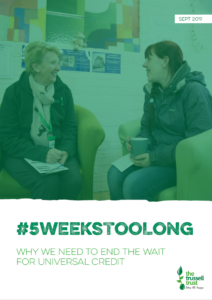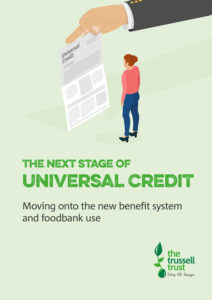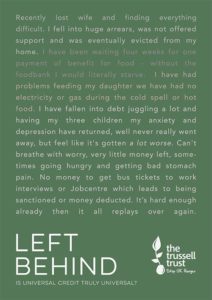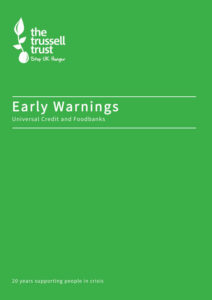Universal Credit and Food banks
The Trussell Trust has been monitoring the roll-out of Universal Credit, the largest welfare reform in a generation.
Universal Credit is not the only benefit people at food banks are experiencing issues with, but it is a significant factor in many areas.
The Trussell Trust has released a series of reports exploring the impact of the roll-out and design of Universal Credit on claimants and food banks.
#5WeeksTooLong (2019)
Universal Credit is the future of our benefits system and should be pulling people out of the tide of poverty. Yet this report shows how the move to Universal Credit – specifically the five week wait for the first payment – locks people into hardship.
New case study evidence and analysis of support service data illustrate the ongoing impact of the minimum five week wait and the limits of current policies to mitigate its effects.
Key Findings
- The minimum five week wait for Universal Credit – either without income or with a Department for Work and Pensions (DWP) Advance Payment – has led to acute financial hardship, and damaged households’ longer-term financial resilience. This includes destitution, housing insecurity and debt.
- The study also reveals the detrimental impact the wait is having on people’s mental health. Many people reported experiencing high levels of anxiety, especially as they did not know how much they would receive and when. Some even reported feeling suicidal.
- Services like advice agencies, council-led crisis provision, and food banks have been forced to deal with the fall-out from the minimum five week wait, as claimants turn to non-DWP support to manage financial hardship
- Current DWP support is often not enough to mitigate the impact of the minimum five week wait. Advance Payments have left claimants deciding between hardship now or hardship later. Other financial support is piecemeal and has not prevented hardship.
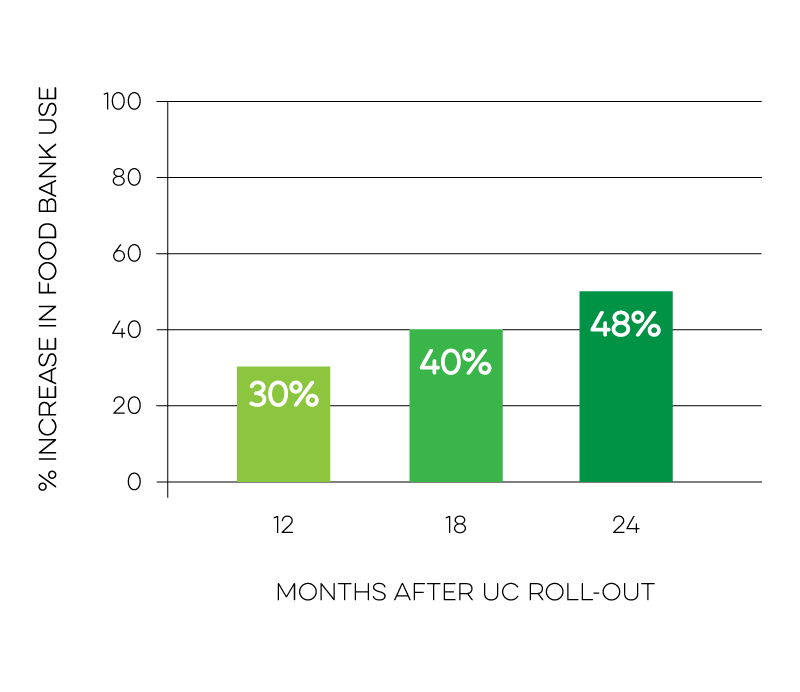
Food bank use rose in the months following the roll-out of Universal Credit, by 30% after 12 months and by 48% after 24 months.
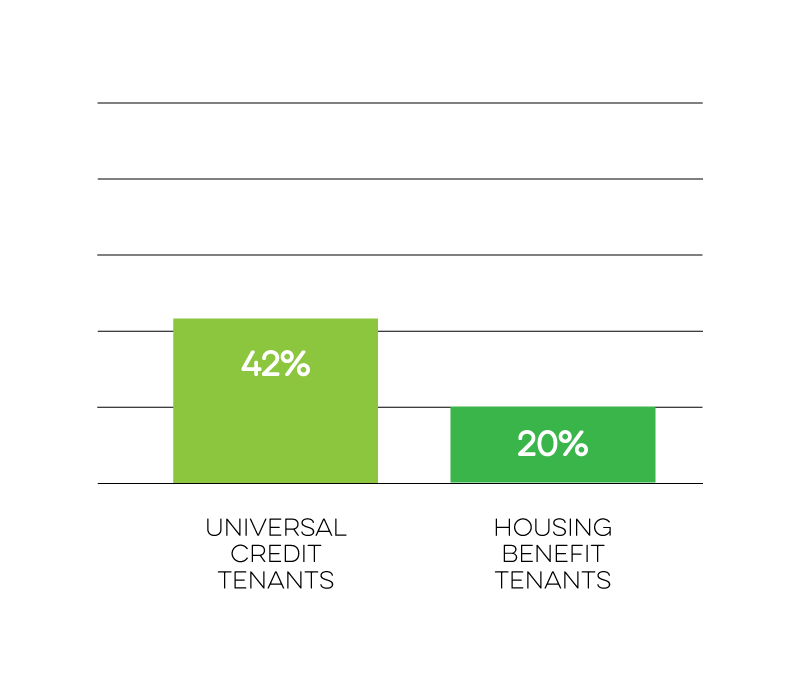
Riverside Group tenants claiming Universal Credit at July 2019 had seen a much bigger average increase in rent arrears since roll-out began than Housing Benefit tenants.
The #5WeeksTooLong full report is available for download.
The next stage of Universal Credit
By 2019, the rollout of Universal Credit to all jobcentres will be complete, and the next stage of Universal Credit will begin. Three million people currently claiming other benefits and tax credits will have to move onto the system. The Trussell Trust is concerned that, given the links between Universal Credit, financial hardship, and food bank use, this next stage could lead to increased financial need and more demand for food banks. The report uses referral data from Trussell Trust food bank vouchers to examine the impact of Universal Credit on food bank use.
Key Findings
- When Universal Credit goes live in an area, there is a demonstrable increase in demand in local Trussell Trust foodbanks. On average, 12 months after roll-out, food banks see a 52% increase in demand, compared to 13% in areas with Universal Credit for 3 months or less. This increase cannot be attributed to randomness and exists even after accounting for seasonal and other variations.
- Benefit transitions, most likely due to people moving onto Universal Credit, are increasingly accounting for more referrals and are likely driving up need in areas of full Universal Credit roll-out. Waiting for the first payment is a key cause, while for many simply the act of moving over to a new system is causing hardship.
Learn more about The next stage of Universal Credit.
You can also download our full report in PDF format.
Left Behind: Is Universal Credit Truly Universal?
The research finds that Universal Credit is currently unable to provide a well-functioning service for some of the people in our society most in need of support, leading to an increased burden on the third sector. Poor administration, the wait for the first payment, and repayments for loans and debts are driving some people to severe financial need. This is particularly acute for families with dependent children and disabled people. A true Universal Support system and more financial support can turn the tide to make sure Universal Credit can achieve its principles whilst still maintaining a robust safety net for people when it is most needed.
The findings from the report come from a survey of people referred to food banks in the Trussell Trust’s network, delivered by food bank volunteers and managers in 30 food banks in areas of full Universal Credit roll-out in England, Scotland, and Wales, between February and March 2018.

56% had experienced issues with housing

8% of respondents said their full Universal Credit payment covered their cost of living

57% had experienced issues with mental or physical health

5% of people who said they were disabled or had ill-health said their full Universal Credit payment covered their cost of living
Key Findings
- The wait for a first payment had severe and immediate consequences: 70% of respondents found themselves in debt, 57% experienced issues with their mental or physical health, and 56% experienced housing issues. The majority of respondents were waiting or had waited the intended weeks for their payment but this wait still had severe financial implications.
- There was little statutory support available during this wait. 63% were offered no help, while the most likely form of help offered was a food bank voucher. Advance payments were helpful for some, whilst a half who provided detail said they were unhelpful, too little, or unaffordable to repay.
- Only 8% said their full Universal Credit award covered their cost of living. This was even less for disabled people or people with ill-health, of whom 5% said the award covered their cost of living.
- Poor administration was a persistent concern. 35% had waited, or were waiting, longer than six weeks for their first payment. A third had experienced poor communication, and 30% had experienced underpayment. Over- and underpayment were particularly rife amongst those in work, with 50% in work affected.

70% had experienced debt during the wait

40% cited repayments as an issue whilst on Universal Credit
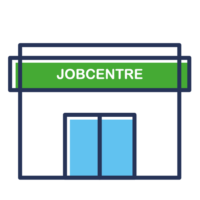
Only 8% were offered any kind of support from the jobcentre or local authority during the wait for the first payment

a third cited difficulties keeping up with requirements
Recommendations
- Local authorities should provide a true Universal Support service which: supports people transitioning onto the service or making a new claim; expands support for people with the greatest financial need; and extends beyond the initial claim or transition.
- People should have longer to repay advance payments, and more frequent payments and payments direct to landlords should be offered to all in financial need or at risk of financial need.
- Uprate benefit payments in line with inflation, run-on Employment and Support Allowance payments during the wait for the first payment, and restore the work allowance to pre-April 2016 levels.
- An urgent inquiry into poor administration within Universal Credit and its effects, particularly in relation to insecure work.
- More flexibilities for requirements, particularly for disabled people and people with ill health, and a yellow-card warning system for sanctioning.
The Left Behind: Is Universal Credit Truly Universal? full report is available for download.
Early Warnings: Universal Credit and Foodbanks (April 2017)
In April 2017 we published our report Early Warnings: Universal Credit and Food banks, shedding light on some of the impacts of the transition to Universal Credit (U.C.). The report found that food banks in areas of Universal Credit roll-out were finding people referred to them were falling into debt and mental health issues as a result of the six week wait for the first payments. Many food banks’ operations were stretched due to increased demand, with volunteers acting either as welfare advisers or too busy giving out food to offer a listening ear and signposting.
We used the findings to suggest practical ways in which any adverse side effects of the Universal Credit roll-out could be mitigated.
- Universal Support: More information about the shape and form of Universal Support locally, particularly ahead of full Universal Credit roll-out in an area, would bring welcome clarity to food banks.
- Six week wait: A reduction of the initial six week waiting period for Universal Credit would make a significant difference to people’s ability to cope with no income. The seven-day unnecessary ‘waiting period’ before the assessment period begins could be reduced first.
- IT & flexibility: More flexibility in the administration of Universal Credit is needed to support people moving onto the new system. For example, more support for people applying online who are unfamiliar with digital technology, and support to improve people’s ability to move into work and stay in work.
- Conditionality: Continued monitoring the impact of conditionality, in particular in-work conditionality, which has been linked to increased food bank use.
More recently, we have advocated for a pause in the roll-out, better availability of affordable advance payments, and welcomed changes to the cost of calling the Universal Credit hotline and reductions to the six week wait. We have also submitted evidence to the Work & Pensions Select Committee inquiry on Universal Credit, which can be found here.
The Early Warnings: Universal Credit and Food banks full report is available for download.
